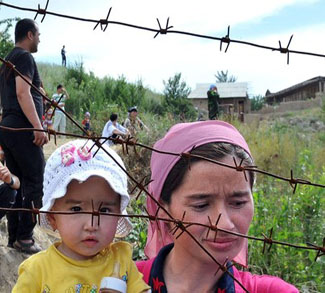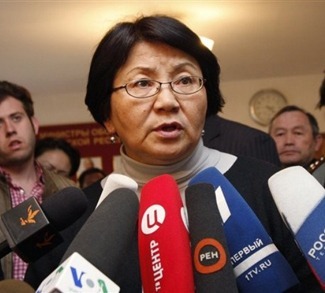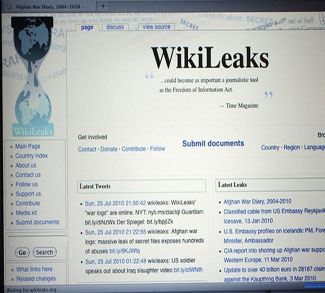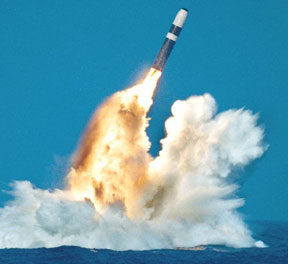FORECAST
The recent outburst of ethnic violence in Kyrgyzstan will serve to strengthen Russian influence in the region.
It didn’t take long for the Kyrgyz interim government’s reprieve to expire. Just a week ago, Edil Baisalov, the interim government’s chief-of-staff, quit out of disdain for the “same old corrupt schemes” of Kyrgyz politics. Now, its problems have multiplied as ethnic cleansing has erupted in the south of the country, killing up to 1,000 and displacing over 80,000 ethnic Uzbeks.
It should come as no real surprise that interim President Rosa Utanbayeva’s immediate reaction was to request Russian peacekeeping forces. After all, similar outbursts of ethnic violence in 1990 were quelled through interventions by Moscow. What is interesting however is the desperate tone of the request, particularly her statement that Kyrgyzstan is now facing collapse.
This provides a window into the exceedingly tenuous situation that the interim government now finds itself in. The dust has not yet settled after the overthrow of former President Bakiyev and the current government has not been able to entrench itself or legitimize itself through new elections. Furthermore, there is always the potentially-explosive possibility of a surprise return from former President Bakiyev, who is currently living in exile in Belarus.
On top of this tense political situation, there is also the ex-factor of the drug trade. Kyrgyzstan is a hub for Afghan heroin travelling through to Europe or Russia, and as such it houses several powerful criminal networks. If not already actively involved, these networks may choose to take advantage of the weak central government and jump into the fray, exacerbating ethnic violence and instability.
Whether or not ethnic tensions boil over into widespread violence or even civil war, Russia’s strategic position stands to gain from recent events in Kyrgyzstan. Moscow made sure to reject early calls for Russian peacekeepers to be deployed in Kyrgyzstan, instead calling an emergency meeting of the Collective Security Treaty Organization (CSTO) to come up with measures to halt the violence. By routing the conflict through the CSTO, Moscow has made sure to not act unilaterally- and thereby forestall accusations of Soviet-era imperialism. In doing so, the importance and influence of the CSTO has also been bolstered, generating a win-win for Russian diplomacy.
A victory for the CSTO has the side-effect of lessening the importance of other regional players vying for the hearts and minds of Central Asian republics. While it’s quite possible that Washington has temporarily sacrificed the prospect of true NATO penetration into the region on the altar of US-Russian cooperation, this definitely comes as a blow to the Shanghai Cooperation Organization (SCO). In fact, the SCO has been conspicuously absent during the entire course of the Kyrgyz political crisis. It seems that the initial prognosis of Sino-Russian cooperation in Central Asia being impossible was indeed correct, and the SCO will forever remain long on style and short on substance.
Whatever the outcome of the violence gripping southern Kyrgyzstan, Russia stands to win. This crisis has proven that no matter how much Washington and China have tried to dislodge Central Asian republics from the Russian sphere of influence, Moscow is still paramount in Central Asia.
SUMMARY OF EVENTS: June 7th – June 14th, 2010
NORTH AMERICA
United States
As many as 40,000 barrels (1.7 million gallons) of oil a day may have been gushing out from a blown-out Gulf of Mexico well, doubling many estimates.
Tests have shown that underwater oil plumes are travelling dozens of miles from a leaking well in the Gulf of Mexico, the US government says.
A new report by the watchdog group Physicians for Human Rights alleges Monday that the Bush Administration experimented on terrorism suspects during their enhanced interrogation program put in force starting in 2002.
The Pentagon is trying to establish the whereabouts of the founder of Wikileaks, the whistle-blowing website, as it tries to stop the publication of classified documents it says could damage US national security.
Canada
The RCMP anti-terrorist unit has taken over the investigation into a mystery man who lied about representing a local brewer and bought about 1,500 kilograms of fertilizer — an amount they say is enough to make a bomb.
WESTERN EUROPE
NATO
NATO leaders declared Friday that the alliance had regained the initiative in the Afghan war, promising that the gains could result in a handover of security responsibilities to local authorities by year’s end.
Netherlands
The Freedom Party of the anti-Islam MP Geert Wilders emerged as the third force in Dutch politics last night, more than doubling its number of seats in Parliament in the country’s general elections.
Spain
Spanish public sector workers have held a day-long strike in protest against an average 5% cut in pay that comes into effect this month.
MIDDLE EAST
Israel
The U.S. welcomes Israel’s decision to start an internal investigation into last month’s deadly attack on a Gaza-bound humanitarian aid convoy in neutral waters, a White House spokesman said on Monday.
Iran
The Iranian government says it has evidence that one of its nuclear scientists was abducted and is being held in the US against his will.
Iran’s elite Revolutionary Guards are ready to provide a military escort to cargo ships trying to break Israel’s blockade of Gaza, a representative of Supreme Leader Ayatollah Ali Khamenei said Sunday.
The UN Security Council has voted in favour of fresh sanctions against Iran over its nuclear programme.
Gaza
The Iranian Red Crescent has decided to send two aid ships to Gaza this week in the latest bid to break the blockade imposed on the Palestinian territory by Iran’s regional archfoe Israel.
Autopsies on bodies of activists killed in Israel’s attack on a Gaza-bound aid flotilla five days ago indicate that the victims were shot multiple times at close range.
CENTRAL ASIA
Kyrgyzstan
Kyrgyz mobs burned Uzbek villages, slaughtered their residents and stormed police stations seeking to loot more weapons Sunday as ethnic rioting engulfed new areas in southern Kyrgyzstan.
At least 26 people have been killed in clashes in Kyrgyzstan’s second-largest city of Osh, officials say.
SOUTH ASIA
Pakistan
Pakistan’s ISI intelligence agency provides funding, training and sanctuary to the Taliban in Afghanistan on a scale far greater than previously believed, a study claimed Sunday.
Afghanistan
An explosion in Kandahar province in southern Afghanistan has killed at least 39 people, Afghan officials say.
The presence of British troops in Helmand was a “national security imperative” and it was highly unlikely they would be deployed elsewhere in Afghanistan, defence secretary Liam Fox, said today.
India
The U.S. government virtually ruled out any further review of the investigation into the Bhopal industrial disaster of 1984, and in particular refused to discuss the extradition of American citizen Warren Anderson, CEO of the company behind the leak of poisonous gasses that led to the death of many thousands of people.
EAST ASIA
China
Increased defense cooperation will be among the topics discussed when Chinese Vice President Xi Jinping visits Bangladesh, Foreign Minister Dipu Moni said on Sunday.
Iranian President Mahmoud Ahmadinejad on Friday brushed off as “worthless paper” a new U.N. Security Council sanctions resolution against his country, and he seemed to blame the United States for “bullying” his ally, China, into joining the sanctions push.
Japan
Japan is at “risk of collapse” under its huge debt mountain, the country’s new prime minister has said.




